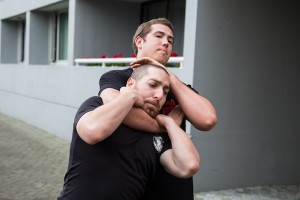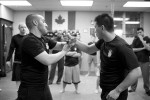Jonathan Fader, left, and his business partner Borhan Jiang show a class at Urban Tactics Krav Maga how to disarm an attacker who has a knife. (photo by Albert Law)
When Jonathan Fader copied the Jewish Independent on an open letter that he posted online in mid-August, Operation Protective Edge was winding down. Noting the sometimes violent antisemitism that it had evoked in places around the world – including in some protests that took place in Canada – he stressed the need for members of the Jewish community to know self-defence. Since then, there have been two terrorist attacks on Canadian soil.
In the letter, he wrote, “I am asking you to please take it seriously and find your local krav maga gym and start learning to protect yourself. If there is none near by, at the very least find the most comparable style, just learn something!”
Intrigued, the Jewish Independent visited the Richmond location of Urban Tactics Krav Maga, Inc., in September. Fader and his business partner, Borhan Jiang, who has been featured in the Independent on more than one occasion, also have a Burnaby site.
Raised in a somewhat observant household, Fader, 27, said he nonetheless “didn’t really identify with being a Jew.” He describes himself as secular, and doesn’t “believe in religion but, of course, if the world is going to call me a Jew … I might as well accept it, and I’m a proud to represent the culture, but I’ll do it realistically…. I support Israel and what it does because, realistically, that’s just the way it is, but I have criticisms like anyone else.”
From 2009-2011, Fader lived in Israel. He went there for the purpose of joining the Israel Defence Forces, and he served in the 424th infantry battalion in the Givati regiment.
“When I came back, I literally did nothing,” he said. He had some savings and, “I was just living with my parents, living off of [my savings] for like five months. I did nothing.”
He spoke about some of the difficulties soldiers have in returning to civilian life. In his opinion, the “reason that they’re so slow to deal with PTSD and depression in Israel is because it’s less apparent, as everyone does the army and, when you go home, people understand, and you have people to talk to. So, the rates are much lower, but there … [are] still suicides and still depression…. But, when you come back here,” he said, referring to Canada, “you don’t have the support of your family or your friends because nobody understands what it’s like,” even if PTSD is more recognized.
He acknowledged that, as a result of the work of veterans here, “more PTSD and depression is being dealt with now and in the North American armies at least.” Once an “invisible group of people,” he said soldiers have become more vocal. If you look at the Canadian army, they now are starting to put psychiatrists actively in duty, he said.
For these and other reasons, Fader is studying psychology at Kwantlen Polytechnic University College. “I find that psychology really helps me understand everything, from marketing to trends to people, just everything,” he said, attributing the effectiveness of krav maga as a system of self-defence to the fact that “it’s working off of real psychology, action-reaction rate, fight or flight.”
He noted about Urban Tactics’ clients, “Interesting thing about that is, when we first started, we figured it was going be all young guys … but that wasn’t the case.… For the first year, it was predominantly males age 30 to 50 with families who wanted to protect the family.”
In general, Canadians don’t understand “what self-defence is and when aggression is appropriate, when violence is appropriate,” said Fader. Noting that women tend to be more vulnerable, he said, to defend yourself successfully, “you need to be able to hit hard and fast, and really be willing to damage the person who is attacking.”

People here have the idea that you should never hit back and that you can talk yourself out of every situation, he said. And, he agrees, to a point: the first step for self-defence is to avoid the conflict completely, to not put yourself in a position where you might end up being in danger. However, if you do end up in trouble, you need to be able to assess whether talk will be enough because, “if you think you’re in danger, you need to attack first … because [with] action versus reaction, reaction is always slower…. [In] proper self-defence, it is absolutely OK to strike first.”
He gave the example of a person walking through an alley at night and being attacked. First, he noted, the choice to walk down the alley was probably not a good one, “and you have to take some of the blame now because that’s a grand scheme self-defence: Why are you there? If you go there thinking nothing is going to happen, that’s ridiculous.” But, now that you’re in trouble, he said, if you have the chance to run, “it’s OK to run, it’s OK to avoid the situation.” If you can’t run, then you have to act first if possible, “because if you wait, you could be knocked out … [so] kick him in the groin, go for his eyes … push, run.”
A good instructor, said Fader, will drill it into your head to avoid a situation, then teach you some basic techniques. But still, all the technique in the world won’t help you if “you’re not willing to hit that guy in the groin, go for his eyes, go for his throat,” he said.
Krav maga isn’t a fitness class. “I’m not teaching cardio kickboxing,” said Fader, “but the thing is that you need to be in some physical capability in order to legitimately defend yourself against a violent attack…. You have to be able to move correctly. Some people who are … limited in what they can do but they mentally are willing to hit hard, hit fast, will be OK, reasonably, if they’re up against a trained attacker…. We don’t teach fitness but you will get in shape … but I don’t care if you lose five pounds – I want you to know that you can defend yourself.”
The fact that both he and Jiang have trained in Israel sets Urban Tactics apart from other places that offer krav maga, said Fader. “The fact that we understand both cultures – North American and Israeli – is what truly makes us different.” While most martial arts will teach you techniques that will help you stay upright during a conflict, if you do fall to the ground, and if your opponent has a weapon or an accomplice, “going to the ground is the worst possible thing you can do, even if you’re a Brazilian jiu jitsu black belt.… We teach ground stuff, but it’s about everything you can do to get up.”
In the end, said Fader, the techniques he teaches focus on reality, how people react in a physically threatening situation. “How do you need to deal with it, what’s the strategy? It’s a constant assessment. We don’t just do a move and stop [in our instruction]. We always make sure, Are your hands still up? Are you paying attention? Are you looking around arbitrarily or are you actually actively scanning?” Proper training, he said, will teach you how to continually assess your situation, as every second counts.
Fader acknowledged that he may lose in a boxing match or a karate bout that only allows certain types of hits, but “in a street fight, I’m going to beat this guy because I’m playing by no rules. I do whatever I have to do.”
For more information about self-defence courses and Urban Tactics, visit urbantacticscanada.com.

